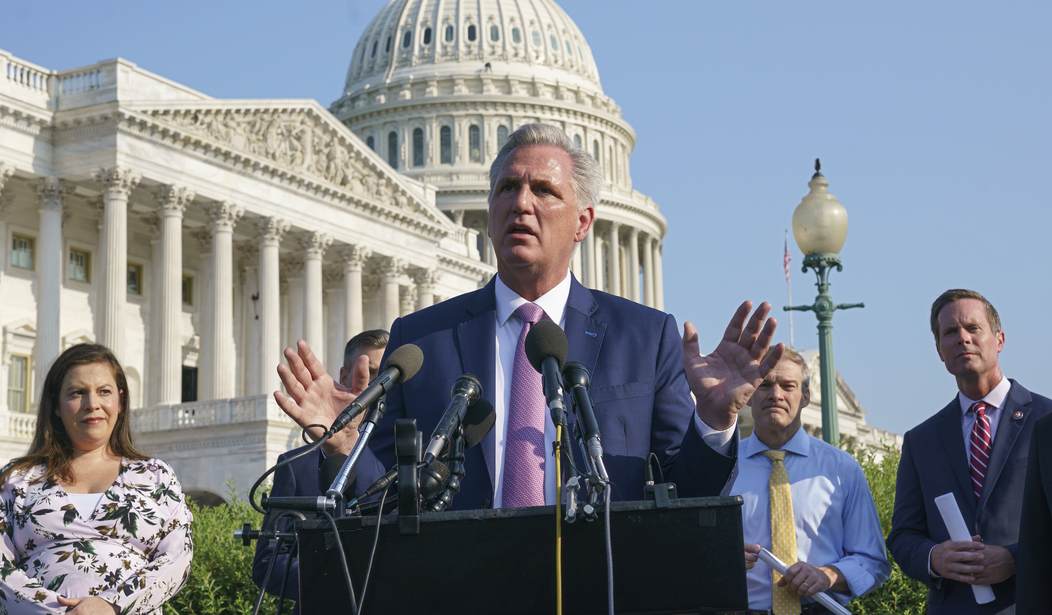Senate Republicans are pushing back on the emerging House GOP strategy to shut down the government if Congress doesn’t meet certain conditions.
“I think it’s better to figure this out before the end of the fiscal year and rather than engage in that sort of self-destructive behavior,” Sen. John Cornyn (R-Texas) said this week, telling reporters “nobody wants to shut down.”
That’s not true. There are plenty of House Republicans who not only want a shutdown but also think that shuttering the government would be a positive thing.
“Eighty-five percent or so of the government continues to operate, and most Americans won’t even miss it,” Rep. Bob Good (R-Va.) told The Hill last month.
“And if that’s the leverage that we need to utilize to force the Democrats to accept spending cuts and an end to the harmful policies that are, again, crushing the American people — I mean, then we need to do that,” he added.
The Freedom Caucus has sworn to shut down the government unless there are changes to border policy, a reining in of a “weaponized” Justice Department, and an end to woke policies initiated by the Defense Department.
With only 11 legislative days left before the September 30 deadline to fund the government, it’s almost certain that the House and Senate will have to deal with a stopgap funding bill — a continuing resolution (CR) — to keep the government going.
How long the CR will fund the government is undecided. Given the work remaining — 12 appropriations bills needing to be passed — there is some talk of extending the CR to the end of the year.
House Freedom Caucus members are going to hold both the Democrat’s and their GOP colleagues’ feet to the fire.
“In the eventuality that Congress must consider a short-term extension of government funding through a Continuing Resolution, we refuse to support any such measure that continues Democrats’ bloated COVID-era spending and simultaneously fails to force the Biden Administration to follow the law and fulfill its most basic responsibilities,” the Freedom Caucus said in a statement.
Separately, the group has indicated it will not support a “blank check” for Ukraine. This probably means that House Speaker Kevin McCarthy (R-Calif.) will be forced to separate Ukraine funding from the CR.
“The question should be what comes after you shut down the government,” said Sen. Mitt Romney (R-Utah).
“And the answer has always been ‘Well, we’ll reopen it again,’” Romney told The Hill. “And of course, we reopen it at great expense, great inconvenience for the American people, and have accomplished nothing other than making a big noise.”
Romney isn’t wrong. The history of these continuing resolutions makes it impossible to budget responsibly. Congress appropriates money a few months or weeks at a time and invariably and inevitably, they spend far more than can be reasonably justified. By the time a budget deal is struck, Congress has spent hundreds of billions of dollars more than they intended when starting.
There is so much work left to do for both the House and the Senate and so many hard issues to resolve, including abortion, transgender rights, and the border, that a shutdown is virtually certain.
In the Senate, negotiators passed all 12 annual funding bills out of committee before leaving for the August recess, and are set to vote on their first batch of spending legislation next week. That includes dollars for Departments of Veterans Affairs (VA), Transportation and Housing and Urban Development, as well as the Food and Drug Administration.
Members are hoping to see full floor votes on all 12 bills, which passed with overwhelming bipartisan support in committee. But there is uncertainty around timing for floor consideration for tougher areas of proposed funding.
Speaker McCarthy has a lot less leeway to make a deal this time around. The Freedom Caucus is going to hold his feet to the fire on spending levels passed by the GOP House and if he tries to undercut their Caucus, McCarthy may be challenged for the speakership.
Democrats are going to blame Republicans for any shutdown — as they always do even if it’s their fault. And the media follows their lead in blaming the GOP. Polls almost all show that the public blames both parties equally.
This is no way to run a railroad — or a government, for that matter.










